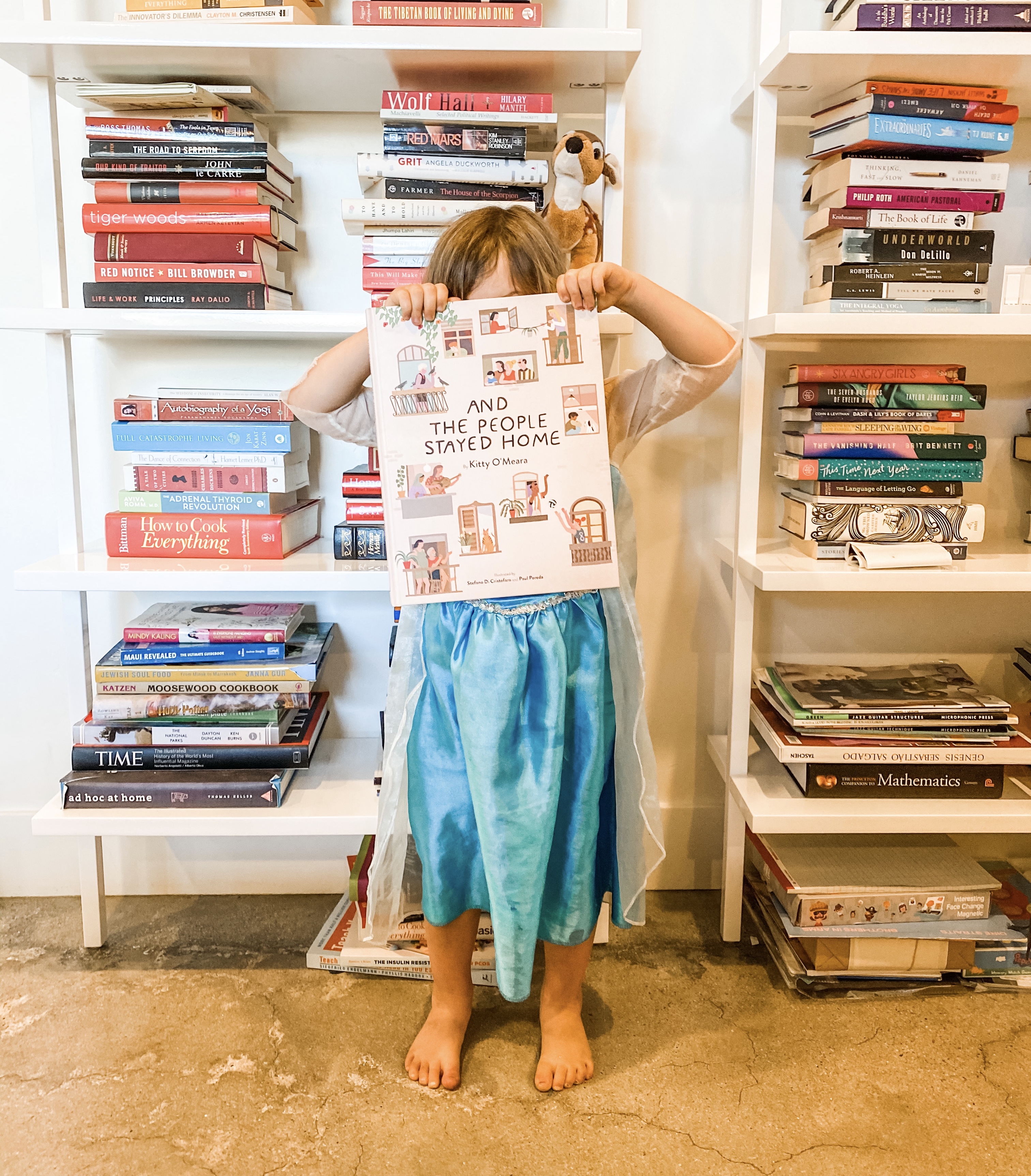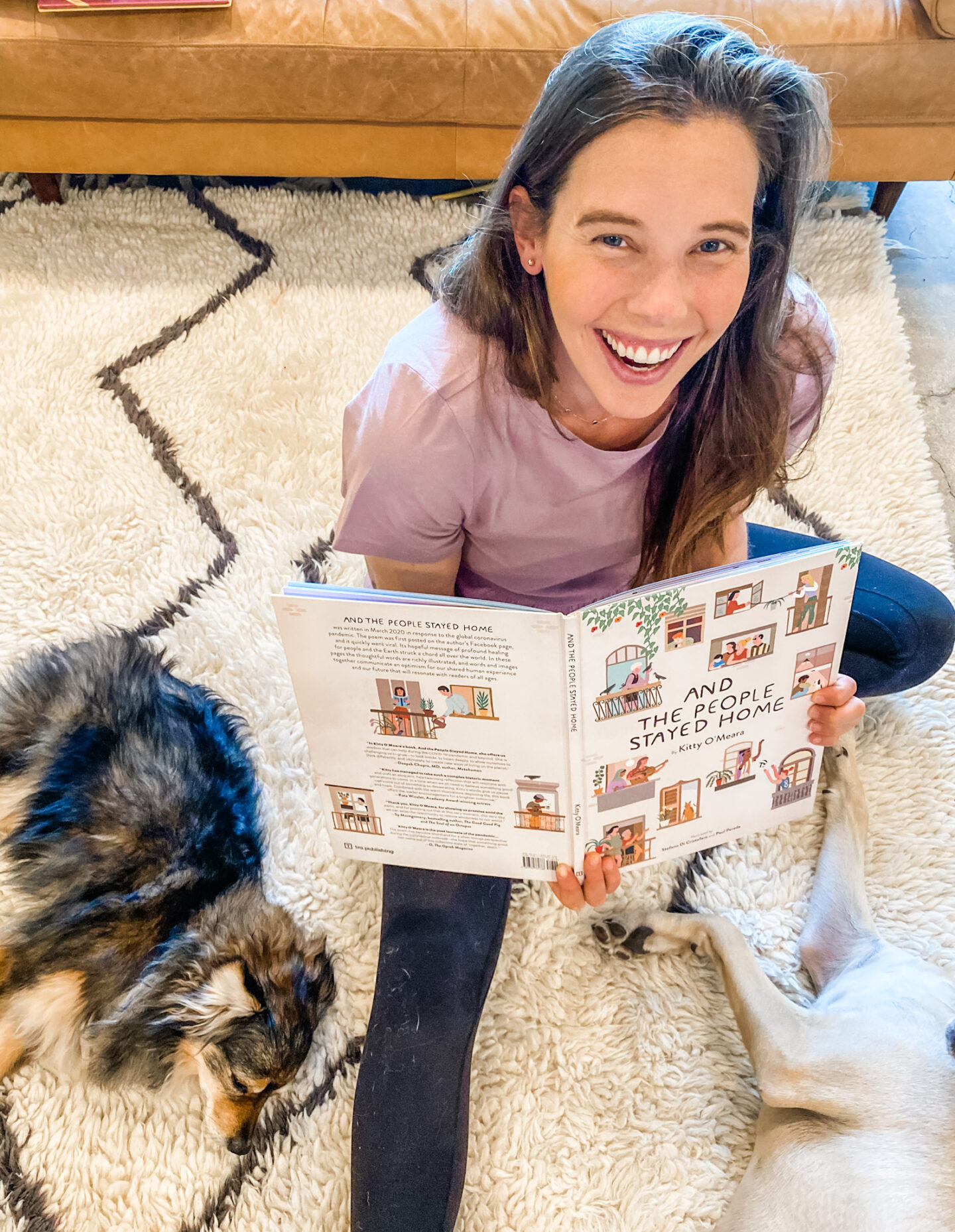And How It’s Changed Me For The Better.
I initially saw “And The People Stayed Home” by Kitty O’Meara all over #bookstagram several months ago. But, to be honest, I didn’t really want to read a picture book about the nightmare that I already had to live through every day, so I resisted the urge to purchase it. However, when a friend of mine recommended it, and told me how positive and lovely it was, I changed my tune, and decided to check it out.
And guys, it is really lovely. Not only is the artwork “frame-worthy,” but the incredibly short and simple prose really lifted me up, and caused me to pause and reflect on all the good I have been fortunate enough to glean from this overall pretty ugly year.
So, below, I have laid out the five main things “staying home” this year has taught me, and how I hope to be changed for the better going forward.

1. You Don’t Have To “Do More” To Be Good Enough
One of my favorite lines from this book appears when the narrator is describing how “the people” changed during quarantine. In short, he says that they rested, exercised, made art, and “learned new ways of being.”
Before the pandemic, I was “running on a treadmill” in a lot of ways. I wanted to do more at work, have a more “Pinterest-perfect” classroom, eat healthier, meal-prep better, workout more often, etc. A lot of these things “matter,” and are, in a way, worthy endeavors, but my mindset towards them was all wrong.
Because when I look back on it, I was already doing all of these things. Were they perfect? Nope. But the effort (and the positive results) were there. Yet, for some reason, I never felt like any of it was “enough.” Like I had to keep going, and keep getting better, in order for any of it to be “worth it.”
But that way of thinking essentially invalidates everything that I’ve done up to this point, as well as everything I will do, before achieving some non-existent embodiment of “success.” If I never go back to the classroom again (which is unlikely), I still will have had a very “successful” teaching career. If I skip a week of working out, or serve my kids fewer vegetables, I’ve still cared for myself, and for them, the best I know how.
This pandemic, and the choices I’ve made in the face of it, have reminded me that at the end of the day, a lot of the stuff I thought mattered, really doesn’t. And that a lot of the things I thought I had to keep doing (and doing better), because I had been doing them for so long, were actually things that I could let go of, freely, and without regret. And as I sit here writing this, for the first time in a long time, I don’t really have a plan for what I want to “achieve,” or “do more of,” in a lot of facets in my life. And boy, does that feel good.
2. Less Stuff Means More Time
I’ve always liked stuff. I don’t own a lot of clothes, or jewelry, or shoes (my dog just eats those anyway…) but I do have a lot of things. My husband and I have gone through many phases of life together: the phase where we traveled and went skiing several times a year, the wedding registry phase, the biking and hiking and honeymooning phase, the “our newborn doesn’t sleep so I will purchase anything marketed towards exhausted parents” phase, etc.
And while I’m good at collecting things, I’ve realized this year that I’m not so good at letting them go. I think, for me at least, it’s sometimes hard to part with something that is somehow symbolic of a certain phase of life. By selling my skis, I feel as if I am officially saying goodbye to the freedom I enjoyed in my 20s. By throwing away stacks of curriculum I wrote during my years in TFA, it’s like I’m deeming all that work worthless, and practically unusable.
But this year, I’ve learned that saying goodbye to something doesn’t have to be sad. In fact, it can be very freeing. While saying goodbye to some of my travel gear could be a reminder of what I don’t have, it could also serve as a reminder of the new, and even better, blessings that are currently keeping me at home. And while throwing away that curriculum box could be incredibly frustrating, it could also serve as a testament to how hard I’ve worked over these past 10 years, and how far I’ve come as both a teacher, and a learner.
Most importantly, once the stuff is gone, I don’t have to waste time or energy thinking about it anymore. And that has freed up a lot more time in my life, and space in my heart, to focus on the good stuff that’s right in front of me.

3. Sometimes Self Care Is Impossible. Grieve That, And Move On.
“Self-care” is all the rage these days. Everyone seems to have advice how necessary it is, and where you can find it. However, there have been times over the past several months when self-care simply did not fit into the equation for me or, I’m sure, for many of us.
And I have spent a lot of time being frustrated by this, and complaining about it, and desperately seeking out ways to eek some self-care out of my jam-packed weekends, only to be disappointed, over and over again.
But recently, with baby #3 on the horizon, and the end of the pandemic still a bit further out than I would have liked, I have come to accept the fact that there will be weeks, or months, in which I am unable to do pretty much anything for myself. And while that sucks, and I am allowed to grieve it, and find someone to complain about it to, I can’t let my bitter feelings about it infiltrate other areas of my life, and make me forget all the joy I can get out of being with, and taking care of, others.
And I can’t let the current moment allow me to forget that one day, even if it feels really far away, this too shall pass, and I will be able go for that haircut, or that date night, or that trip to wine country with my girlfriends that I may or may not have been planning in my dreams for about 8 months now…
4. Reprioritize Relationships That Really Matter, and Let Go Of Rejection.
One really fascinating thing about this pandemic is that it has fundamentally shifted a lot our social relationships. Everyone has a different level of risk-tolerance, a different level of risk, and different social-emotional needs. Because of this, we’ve all had to reprioritize some relationships over others, or even back away from some entirely.
The hardest part of this, for me at least, has been that while I understand my own reprioritizations, I can’t, and probably never will, understand other people’s. And as I spent some time this year thinking about why certain people stuck around, and other’s didn’t, it made me reflect on who I really missed, and who I didn’t.
And while I know that all of this is definitely going to have a long-term impact on how I approach relationships from here on out, I want to make sure that impact is a positive one. I want to move away from the fear of rejection, and the wondering “why,” and focus more on the things I can control, and the worthwhile relationships that have been able to weather the storm.
5. It’s Never A Bad Idea To Get Some Perspective On Your “Stuff.”
All of us are a little kooky. All of us come from different families, and were influenced by different peer groups, religious affiliations, political backgrounds, communities, etc. Because of this, we all have at least a little bit of baggage, and for many people, this pandemic, and our time in quarantine, has caused that baggage to split wide open, make a huge mess, and confront us with the reality of what’s been locked away in there for who knows how long.
If you, like me, have looked around you at some point in the last 9 months and thought, “I’m not sure I’m equipped for this…” you may want to ask for help. It doesn’t have to be a therapist (although I’m always pro that), but it never hurts to talk out your weirdness with a trusted friend, family member, or partner. If they challenge you on something, learn from that. And if they validate you, be comforted by that. Because even though none of us really likes hearing that we’re wrong, or need to work on something, there’s never been a better time (or more time) to do something about it.
The Book (And Other Resources)
First, the book itself. It’s short, sweet, and very beautiful. (The image below is an affiliate link)

The journal below is a really wonderful guided gratitude / decision-making journal that helped me clarify a lot of these thoughts. I highly recommend it.
